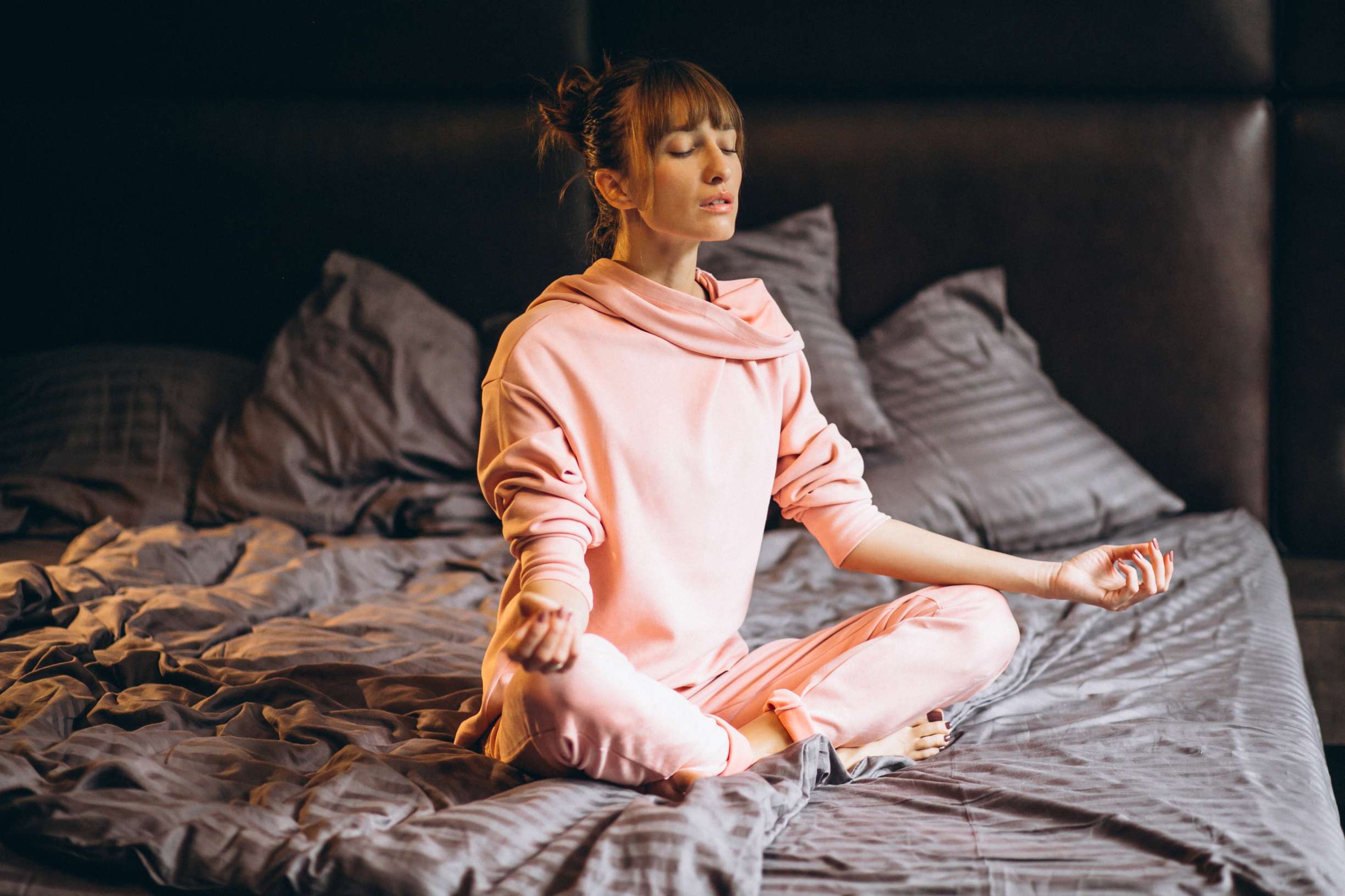Falling asleep is not always easy. Sometimes, even if you are tired, falling asleep gets hard – on your comfortable and cozy bed also. This happens because you want to sleep but your brain is still active or distracted. That’s where meditation for a deep sleep make real sense.
Why Your Brain Craves Stillness Before Bed
When it comes to falling asleep, you don’t have to be physically tired. If this was the case, everyone who often have trouble sleeping could have had a restful sleep. It’s our worries, thoughts and digital distractions that keep us awake.
This is why meditation for relaxing sleep works. It allows the mind to have a more gentle landing. If you meditate before going to bed, you signal to your brain “We’re done for today. It’s time to unwind now.”
Our brains are wired with constant stimulation. We scroll, think, and overthink. But sleep needs the opposite, calm. Meditation is a great way to turn off the mental noise. It works by calming the sympathetic nervous system – the part that keeps you alert – and activating your parasympathetic system.
With regular practice, meditation for a deep sleep becomes less of a trick at night and more of a shift in natural behavior. It’s not that you’re forcing rest, rather, you’re welcoming the opportunity to do so.
What Actually Happens in Your Brain When You Meditate?
Meditation, even if it is only for a short time, can change your brainwave activity. You shift from beta waves that are associated with active thinking to alpha waves that promote calmness. If you continue, theta waves will appear. These are the peaceful and dreamy rhythms that your brain uses to fall asleep.
This shift is powerful. It’s not only about calming down your mind but also preparing your brain to rest. No screen time, no stimulation – just a slow wave into stillness.
Researchers have also noted a decline in activity within the default-mode network – the part of the brain associated with mind-wandering and anxiety. This is good news for people who are lying in bed worrying about tomorrow’s tasks.
The Hormone Story – How Cortisol Impacts Sleep
Cortisol is not bad. It is actually necessary for you to be awake and alert the next morning. When your cortisol levels rise at night, the body becomes tense. The heart rate increases, and sleep gets disrupted or light. That’s where meditation for relaxing sleep plays a role.
The evening cortisol level can be reduced by regular meditation at night. This helps the body to understand that it is time to relax and not be so alert.
The HPA axis, the command centre for your stress hormonal system, will settle down when you focus on breathing slowly and staying in the present moment. This is a physiological change, not just a shift in your mind.
How Meditation Helps the Nervous System Switch Gears
Let’s talk nerves—literally. The body has two basic modes: fight or flight and rest and digest. At night the parasympathetic system, i.e. your relaxation mode should take over.
We can get into fight or flight mode too easily, especially when we are under emotional stress. Heart racing. Muscles tight. Mind racing.
The guided meditation tool can be very helpful in these situations. This technique uses a calm tone, a steady pace, and deliberate breathing to encourage the nervous system to lower their gears. It is not like pushing your body heard, you are just giving your body a gentle nudge to relax. It’s like cozying up the mood for sleep.
Not All Meditation Is the Same—Here’s Why Sleep Meditation Is Special
During the day mindfulness helps you stay grounded and observe thoughts without reacting. But bedtime requires something different.
Meditation for a deep sleep is more about softening your thoughts, not watching them closely. It’s passive. It’s gentle. You aren’t trying to get insight; you’re just slowing down your mind.
Body scans, guided breathing exercises, and visualization techniques are all very useful. You may be asked to visualize yourself floating in water or breathing into different parts of your body. It is not about being perfect but simply slowing down your internal world.
Why Guided Meditation Makes Sleep Easier for Most People
You are not alone if the thought of sitting in silence for a few minutes before bedtime sounds intimidating. The guided meditation technique is very useful. It gives the mind something to hold onto, gently and steadily.
Guided meditations often use voices that are soft and even to provide instructions, visualizations, or cues. Certain long, slow-paced narratives can make you fall asleep without listening to them actively.
Guided medication is great for individuals who normally gets caught up in a whirlwind of thoughts at bedtime. Instead of tossing and turning with your racing mind, meditation guides you through a soft, effortless journey that helps you drift off to sleep naturally.
And the best part? You don’t have to be “good” at it. Just listening, even half-awake, is often enough.
Sleep Gets Better Over Time with Meditation
One session can help. But the real magic shows up with consistency.
Regularly practicing meditation for relaxing sleep builds patterns in the brain. Over time, your body begins to associate certain sounds or rituals with winding down. Sleep becomes less reactive, more responsive.
The amygdala, the brain’s fear center, becomes less active. Heart rate variability improves, which is a strong sign of a balanced stress response. You wake up feeling rested – physically and mentally.
What you are doing isn’t just relaxation. You are rewiring the way your brain responds to sleep. That’s powerful and you should stick to it.
Final Thought
We overcomplicate sleep. It’s a basic need for humans, but one that we tend to ignore. We adjust our pillows, use apps or count our sheep but forget to check on our minds.
Meditation for a deep sleep is simple. It’s not necessary to have fancy tools. A few minutes of stillness and silence or a calm, soothing voice can be enough. This will often be enough to remind your body of the things it already knows – how to let yourself go.
And remember: the goal isn’t to “do it right.” Instead, it’s to simply show up, breathe, and give yourself a break. That small shift can change your nights.
So tonight, maybe skip the scroll. Try a guided meditation for relaxing sleep. You would be surprised to see how much difference even a few moments of stillness can make.






